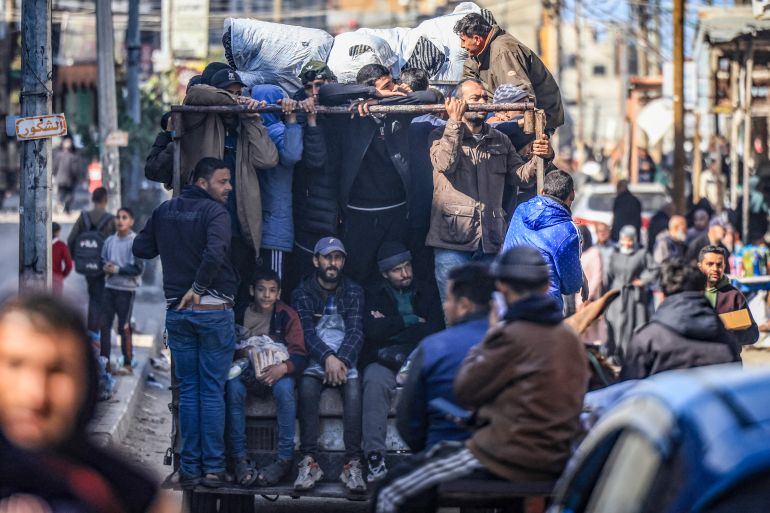Israel plans ground attack on Rafah, ‘last refuge’ for Gaza’s displaced
Israel’s defence minister says army will next target Rafah, the southern area it designated as a ‘safe zone’ for Palestinian civilians.

The Israeli military plans to expand its ground assault into Rafah in the southern Gaza Strip, where most Palestinians in the besieged enclave have been forced to seek shelter amid heavy bombardment of the rest of the enclave.
This has spread fear among the displaced and concerns from global aid organisations as the last place designated as a “safe zone” by the Israeli army in Gaza comes under threat while Israel continues to hamper the flow of aid.
Keep reading
list of 4 itemsWestern coverage of Gaza: A textbook case of coloniser’s journalism
Outrage over ‘What Gaza could be like’ propaganda video
‘Lost to us forever’: Michigan trip exposes Biden’s Arab American rift
“The Khan Younis Brigade of the Hamas organisation is disbanded, we will complete the mission there and continue to Rafah,” Israeli Defence Minister Yoav Gallant said in a post on the social media platform X late on Thursday. “We will continue until the end, there is no other way.”
About 1.4 million of Gaza’s 2.3 million people are crammed into Rafah near the border with Egypt, staying in residential buildings or sleeping in the streets without protection or basic infrastructure.
Al Jazeera’s Hani Mahmoud, reporting from Rafah on Friday, said the displaced population there lacks basics, including toilets and sufficient clean water. They are also “unprepared for winter” with no blankets or suitable clothing, all of which puts them at risk of getting sick, he said.
Mahmoud said Gallant’s statement “shows a total lack of caring” for people in Rafah, who are already facing desperate conditions.
“For many, it’s increased the level of panic. They don’t have anywhere else to go to. This is the last refuge for Palestinians in Gaza. Beyond, it is only the Egyptian border,” he said.
Emad, 55, a businessman and father of six in Rafah, told the Reuters news agency that if Israeli tanks keep coming, “we will be left with two choices: stay and die or climb the walls into Egypt.”
“Most of Gaza’s population is in Rafah. If the tanks storm in, it will be a massacre like never before during this war,” he said.
According to the Ministry of Health in Gaza, the Israeli army has killed more than 27,000 people, mostly women and children, since the war began on October 7, and Palestinians believe Israel’s latest war plan will mean more death and destruction.
“Gallant says the ‘victory won’t be complete unless the military expands into Rafah’ – a city declared a ‘safe zone’. For Palestinians, this means another genocide,” Mahmoud said.
‘Pressure cooker of despair’
The United Nations and international human rights organisations have been raising alarms as the Israeli military gradually expands its ground operations in southern Gaza.
In the past few weeks, Israeli soldiers and tanks have been “encircling” Khan Younis, killing thousands of Palestinians and forcing hundreds of thousands to flee farther south towards Rafah.
Nasser Hospital and al-Amal Hospital in Khan Younis have been under heavy siege by Israeli snipers, tanks and bombs as patients, medical staff and displaced Palestinians are trapped inside.
The UN’s humanitarian office has voiced concern about the hostilities in Khan Younis.
“I want to emphasise our deep concern about the escalation of hostilities in Khan Younis, which has resulted in an increase in the number of internally displaced people seeking refuge in Rafah in recent days,” said Jens Laerke, spokesperson for the UN Office for the Coordination of Humanitarian Affairs (OCHA).
“Thousands of Palestinians have continued to flee to the south, which is already hosting over half the population of some 2.3 million people. … Rafah is a pressure cooker of despair, and we fear for what comes next.”
Israel’s attacks on Khan Younis and its planned expansion into Rafah come after the International Court of Justice (ICJ) made a provisional ruling last week on measures requested by South Africa in its genocide case against Israel. The ICJ directed Israel to take measures to prevent genocidal acts in Gaza and to allow more humanitarian aid into the strip.
Talks to stop the war – at least temporarily – are being conducted between Israel and Hamas with mediation from the United States, Qatar and Egypt. But it appears unlikely that a potentially imminent agreement could stop Israel’s ground incursion into Rafah.